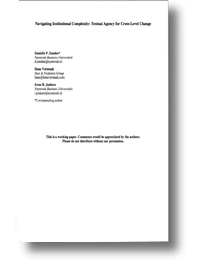Navigating Institutional Complexity
Textual Agency for Cross-Level Change
Current reforms in for instance health care or community development in troubled neighborhoods, are brave attempts at social innovations toward a more sustainable society. Such innovations ask for the questioning, discarding and renewal of ingrained practices and their re-assemblage into novel forms of collective, coordinated action. Societal, macro – level transitions play out in organizational change efforts that are especially challenging because they need to address “wicked problems” that are complex and ambiguous in terms of both content and process and therefore defy the application of simple, short – term solutions. Instead, they require a multidimensional approach and the involvement of many actors with different interests, viewpoints and affiliations.
For social innovations to emerge and succeed, these actors will have to find ways to constructively work with differences in thinking, talking and acting that relate to the institutional levels and logics from which they operate. We see this institutional complexity as a given that needs to be navigated in order to envision and enact meaningful change. How might we go about such navigation? We propose that issue complexity should be matched by a finely tuned simultaneous use of contrasting change approaches. Where in such efforts different levels, logics and processes are deliberately distinguished, they also ask for interaction and connection and will undoubtedly collide. When frictions and tensions occur, these incidents can be used as opportunities for reflection and renewal.
In this paper we explore the potential of a discursive lens and the notion of textual to understand and utilize such moments as openings for cross – level change. We thus combine the institutional concept of agency with the constructionist belief in the constitutive power of language. We tap into the realm of organizational discourse to read, interrupt and sway institutionalized practice. The premise that discourse and organizational change are mutually implicated phenomena, opens up possibilities for the facilitation of deliberate discursive change efforts.
In the exploration of textual agency as pathway for cross – level change, we take our practical experience as starting point. We find that the impetus for cross – level change often arises from the desire to engage in more sustainable interactions with the client, customer, or citizen. In such instances, we deliberately zoom in on the organization’s primary process where professionals are at work and assist them in their acts of embedded agency. This micro – level perspective of getting the job done and renewed, immediately intertwines with different and competing logics. In the actuality of change, a practice orientation is easily undermined by tertiary and secondary processes that have a more macro view and favor political – and organizational logics.
Change agents thus stumble upon cognitive biases and experience the hegemonic conflict between contrasting logics that inform, legitimize and maintain certain roles, routines, identities and vocabularies. Clearly, it’s a struggle to deal with the incompatibilities of this ambiguous context. Yet, true leverage for social innovation may well be found at the core of primary processes where organizations add real value and complexity is often greatest. This micro – level, inside – out perspective fits with a practice approach to organization studies that zooms in on the lived experience of organizational actors and on how their acting and interacting influences the institutional realities in which they work. For this paper we are especially interested in the discursive practices that organizational actors use to exercise their agency. We address the question how their acts of textual agency can be enabled and augmented by dialogic OD interventions.







